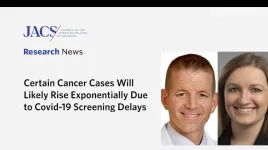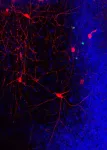(Press-News.org) Key Takeaways
Current cancer diagnoses compared with pre-pandemic rates: Researchers quantified missed diagnoses of lung, breast, and colorectal cancers by comparing observed cancer rates in 2020 with pre-pandemic cancer rates (2010-2019).
Potential increase in undiagnosed disease: Incidence rates for all three types of cancer have significantly decreased, suggesting that many patients may currently harbor undiagnosed disease.
Importance of screening: Study adds to the growing body of literature on pandemic-related disruptions and serves as a vital reminder to encourage all patients to stay up to date on their recommended cancer screenings.
CHICAGO: Delays in cancer screening during the COVID-19 pandemic will likely cause a significant increase in cancer cases that could have been caught earlier with screening, and may now be diagnosed at later stages, placing an increased burden on an already strained healthcare system, according to a new research article published in the Journal of the American College of Surgeons (JACS).
“While the medical system as a whole experienced an incredible burden from the COVID-19 pandemic, now we’re going to see a much different burden present itself due to delays in cancer screening,” said senior author Teviah E. Sachs, MD, MPH, FACS, an associate professor of surgery at Boston University Chobanian and Avedisian School of Medicine and chief of the section of surgical oncology at Boston Medical Center. “With this study, we sought to illustrate with data how we could forecast these likely future trends related to screenable cancer incidence.”
For the study, researchers at Boston University developed a predictive statistical model to quantify missed diagnoses of lung, breast, and colorectal cancers by comparing observed cancer rates in 2020 with pre-pandemic cancer rates (2010-2019). According to the authors, the study is one of the first to look at the number of missed colon, lung, and breast cancer diagnoses at the U.S. population level, and adds to the growing body of scientific research revealing how pandemic-related disruptions constrained cancer care.
“These are all cancers that have very profound incidences in our patient population across the U.S. They are much better managed and often curable when found early, and devasting when caught late,” Dr. Sachs said. “In addition, these are all screening tests that were likely put off during COVID-19 because they require patients to come into the hospital setting.”
To quantify potential missed diagnoses, the team’s statistical model incorporated data from the National Cancer Database (NCDB), which collects data on more than 70% of all cancer cases in the United States.* To adjust for cancer cases not included in the NCDB, researchers standardized the data to the U.S. population using Census data.
Key findings
The team analyzed data from 1,707,395 lung, 2,200,505 breast, and 1,066,138 colorectal cancer patients. Significant differences between the observed cancer rates in 2020 compared with the historical data from 2010-2019 were noted for all three types of cancer:
Colorectal cancer: observed incidence decreased by 18.6%
Lung cancer: observed incidence decreased by 18.1%
Breast cancer: observed incidence decreased by 14.6%
“The incidence for all these cancers decreased, but there’s no reason to believe that cancer incidence dropped during the pandemic in 2020. The data we observe is not likely due to decreasing incidence rates, but I think more likely reflective of missing cancer diagnoses,” said first author Kelsey S. Romatoski, MD, a general surgery resident at Boston Medical Center. “These missed diagnoses are likely going to lead to delays in treatment and upstaging of disease in the coming years.”
In addition, missed diagnoses appeared to disproportionately affect certain sociodemographic populations, including non-White and Hispanic patients and those treated within the Northeast and West regions of the U.S.
Key messages for practitioners
“For these vulnerable patients, it’s especially important that they stay up to date on their screening so we can detect these missed cancers,” Dr. Romatoski said.
“The data in this paper is an important reminder for practitioners to encourage patients who have delayed their recommended cancer screenings to get screened now,” Dr. Sachs added. “And we encourage patients to ask their primary care physician about recommended cancer screenings. It’s imperative that screenings put off due to the pandemic aren’t delayed any longer.”
Study co-authors are Sophie H. Chung, MD; Kelly Kenzik, MS, PhD; Gordana Rasic, MD, MS; Sing Chau Ng, MS; and Jennifer F. Tseng, MD, MPH, FACS.
This article is published as an article in press on the JACS website. This research was also presented at the Grasberger Research Symposium at Boston University Chobanian & Avedisian School of Medicine, Boston, Mass., March 2023.
Dr. Romatoski and Dr. Chung were supported by the Health Resources Services Administration’s National Research Service Award Grant Number T32HP10028.
The authors do not have any relevant disclosures to report.
Citation: Romatoski K, Chung S, Kenzik K, et al. Delays and Disparities in the Observed Versus Predicted Incidence Rates of Screenable Cancers During the COVID-19 Pandemic. Journal of American College of Surgeons. DOI: 10.1097/XCS.0000000000000772.
________________________
*The NCDB is a joint project of the Commission on Cancer (CoC) of the American College of Surgeons (ACS)and the American Cancer Society ACS). The database collects more than 1.5 million new cancer cases each year, representing more than 70% of all cancer cases in the United States.
# # #
About the American College of Surgeons
The American College of Surgeons is a scientific and educational organization of surgeons that was founded in 1913 to raise the standards of surgical practice and improve the quality of care for all surgical patients. The College is dedicated to the ethical and competent practice of surgery. Its achievements have significantly influenced the course of scientific surgery in America and have established it as an important advocate for all surgical patients. The College has more than 87,000 members and is the largest organization of surgeons in the world. “FACS” designates a surgeon is a Fellow of the American College of Surgeons.
The Journal of the American College of Surgeons (JACS) is the official scientific journal of ACS. Each month, JACS publishes peer-reviewed original contributions on all aspects of surgery, with the goal of providing its readership the highest quality rapid retrieval of information relevant to surgeons.
END
Certain cancers will likely rise exponentially due to COVID-19 screening delays
New research quantifies missed diagnoses of lung, breast, and colorectal cancers
2023-05-25
ELSE PRESS RELEASES FROM THIS DATE:
UTHealth Houston awarded nearly $13M in grants to study treatments for traumatic brain injury
2023-05-25
Nearly $13 million in federal grant funds to study treatments for traumatic brain injury, which kills an average of 190 people and hospitalizes another 600 in the U.S. every day, has been awarded to UTHealth Houston by the Department of Defense’s Office of Congressionally Directed Medical Research Programs (CDMRP).
The funding marks a positive step forward for patients suffering from the medical condition, said Charles S. Cox Jr., MD, the George and Cynthia Mitchell Distinguished Chair in Neurosciences and the Glassell Family Distinguished Chair in the Department of Pediatric Surgery with McGovern ...
Research team receives grant to launch ‘Just Dis Tech’ project
2023-05-25
A group of Virginia Tech faculty who represent a variety of disciplines is bringing the principles of disability justice to Appalachia through educational workshops, cultural events, and technology research.
The team received a $502,000 grant from the Andrew Mellon Foundation to create local and regional programming for disability-led arts, culture, reflection, and technology guidance. The foundation is a nonprofit organization that funds arts and humanities work nationwide.
With the three-year project, called “Just ...
Weevils, long-nosed beetles, are unsung heroes of pollination
2023-05-25
Butterflies, bees, and even bats are celebrated as pollinators: creatures that travel from flower to flower to feed, and in the process, help fertilize the plants by spreading pollen. But some of nature’s most diverse pollinators often go unnoticed, even by scientists: long-snouted beetles called weevils. A new study in the journal Peer Community in Ecology provides a deep dive into the more than 600 species of weevils, including ones whose entire life cycles are interwoven with a specific plant that they help pollinate.
“Even people who work on pollination don't usually consider weevils as one of the main pollinators, and people who ...
An emergency department visit as part of a continuum of care
2023-05-25
INDIANAPOLIS -- Even before the COVID-19 pandemic, more than 100 million hospital emergency department (ED) visits took place annually in the U.S. In two studies, Regenstrief Institute Research Scientist Sharmistha Dev, M.D., MPH, and colleagues characterize an ED visit as part of a continuum of care, exploring how an ED visit is a valuable arena to support care beyond the issue that motivated the visit.
“Many people view a patient’s ED visit as a moment of acute care and a moment of dealing with just one issue and then the patient is either admitted or discharged. But ...
Social stress, problem-solving deficits contribute to suicide risk for teen girls
2023-05-25
Teen girls who have greater difficulty effectively solving interpersonal problems when they experience social stress, and who experience more interpersonal stress in their lives, are at greater risk of suicidal behavior, suggests research published by the American Psychological Association.
Suicide is the second-leading cause of death among teens, and rates of suicidal behavior are particularly high among girls. Previous research has found that interpersonal stressors – such as conflict with peers, friends and family – are related to suicidal behavior. Some theories of ...
Saving our soil: How to extend US breadbasket fertility for centuries
2023-05-25
May 25, 2023
Saving Our Soil: How to Extend US Breadbasket Fertility for Centuries
New research from UMass Amherst shows that the rapid and unsustainable rate of topsoil erosion can be drastically reduced with no-till agricultural methods already in practice
AMHERST, Mass. – The Midwestern United States has lost 57.6 billion tons of topsoil due to farming practices over the past 160 years, and the rate of erosion, even following the U.S. Department of Agriculture’s guidelines, is still 25 times higher than the rate at which topsoil ...
Running throughout middle age keeps ‘old’ adult-born neurons ‘wired’
2023-05-25
Aging often is accompanied by cognitive decline. Among the first structures of the brain affected are the hippocampus and adjacent cortices, areas essential for learning and memory. Deficits in cognitive ability are associated with reduced hippocampal volume and degradation of synaptic connectivity between the hippocampus and the (peri)-entorhinal cortex.
Increasing evidence indicates that physical activity can delay or prevent these structural and functional reductions in older adults. A new study by Florida Atlantic University and CINVESTAV, Mexico City, Mexico, provides novel insight into the benefits of exercise, which should motivate ...
Afternoon exercise linked with greater improvements in blood sugar levels for patients with type 2 diabetes
2023-05-25
Over 37 million Americans have diabetes, and 90-95% of that population are diagnosed with type 2 diabetes. Lifestyle interventions, such as a healthy diet and a regular physical activity program, are methods to manage diabetes. A new study from a collaboration of investigators at Brigham and Women’s Hospital, a founding member of the Mass General Brigham healthcare system, and Joslin Diabetes Center, part of Beth Israel Lahey Health, uses data from the Look AHEAD (Action for Health in Diabetes) study, a randomized controlled trial that compared an intensive lifestyle intervention with diabetes support and education in patients diagnosed ...
Your thoughts can harm your neck and back during lifting tasks
2023-05-25
COLUMBUS, Ohio – The mental distress of cognitive dissonance – encountering information that conflicts with how we act or what we believe – can lead to added pressure on the neck and low back during lifting and lowering tasks, new research suggests.
When study participants were told they were performing poorly in a precision lowering experiment in the lab, after initially being told they were doing well, their movements were linked to increased loads on vertebrae in their neck and low back.
Results showed that the higher the cognitive dissonance score, the greater the extent of loading on the upper ...
Tens of thousands of lives a year could be saved by new treatment protocol for brain hemorrhage
2023-05-25
The George Institute for Global Health today announced data from the phase III INTERACT3 study demonstrating that a new combination of treatments for stroke due to intracerebral haemorrhage (ICH) significantly improves the chances of surviving without major disability. Results were presented today at the European Stroke Organisation Conference in Munich, Germany, and simultaneously published in The Lancet.
The INTERACT3 study is the first-ever randomised controlled trial to show a clearly positive outcome for the treatment of ICH. Timely administration of the new treatment protocol – known as a Care Bundle – centred on the rapid control of ...
LAST 30 PRESS RELEASES:
New knowledge on heritability paves the way for better treatment of people with chronic inflammatory bowel disease
Under the Lens: Microbiologists Nicola Holden and Gil Domingue weigh in on the raw milk debate
Science reveals why you can’t resist a snack – even when you’re full
Kidney cancer study finds belzutifan plus pembrolizumab post-surgery helps patients at high risk for relapse stay cancer-free longer
Alkali cation effects in electrochemical carbon dioxide reduction
Test platforms for charging wireless cars now fit on a bench
$3 million NIH grant funds national study of Medicare Advantage’s benefit expansion into social supports
Amplified Sciences achieves CAP accreditation for cutting-edge diagnostic lab
Fred Hutch announces 12 recipients of the annual Harold M. Weintraub Graduate Student Award
Native forest litter helps rebuild soil life in post-mining landscapes
Mountain soils in arid regions may emit more greenhouse gas as climate shifts, new study finds
Pairing biochar with other soil amendments could unlock stronger gains in soil health
Why do we get a skip in our step when we’re happy? Thank dopamine
UC Irvine scientists uncover cellular mechanism behind muscle repair
Platform to map living brain noninvasively takes next big step
Stress-testing the Cascadia Subduction Zone reveals variability that could impact how earthquakes spread
We may be underestimating the true carbon cost of northern wildfires
Blood test predicts which bladder cancer patients may safely skip surgery
Kennesaw State's Vijay Anand honored as National Academy of Inventors Senior Member
Recovery from whaling reveals the role of age in Humpback reproduction
Can the canny tick help prevent disease like MS and cancer?
Newcomer children show lower rates of emergency department use for non‑urgent conditions, study finds
Cognitive and neuropsychiatric function in former American football players
From trash to climate tech: rubber gloves find new life as carbon capturers materials
A step towards needed treatments for hantaviruses in new molecular map
Boys are more motivated, while girls are more compassionate?
Study identifies opposing roles for IL6 and IL6R in long-term mortality
AI accurately spots medical disorder from privacy-conscious hand images
Transient Pauli blocking for broadband ultrafast optical switching
Political polarization can spur CO2 emissions, stymie climate action
[Press-News.org] Certain cancers will likely rise exponentially due to COVID-19 screening delaysNew research quantifies missed diagnoses of lung, breast, and colorectal cancers






